Blogs
European chicken populations are not prepared for future challenges
Thu, 09/19/2013 - 17:50 — Rahel Wyss
Livestock is a key livelihood component for poor households in developing countries but livestock diseases continually threaten the livestock assets, some of the local chicken populations are at risk of extinction, and in Europe there might be problems in the future with regard to conserving genetic diversity in chicken breeds.
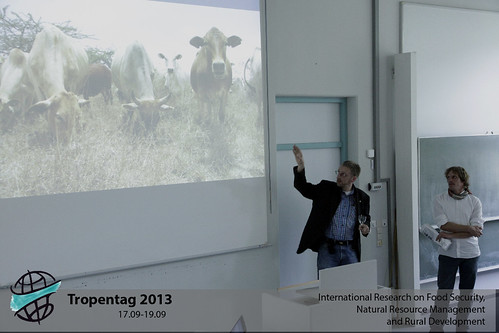 Christian Hülsebusch presenting a Boran Cattle Breeding Study done in Kenya
Christian Hülsebusch presenting a Boran Cattle Breeding Study done in Kenya
 Christian Hülsebusch presenting a Boran Cattle Breeding Study done in Kenya
Christian Hülsebusch presenting a Boran Cattle Breeding Study done in Kenya
A Student's Perspective: What Was Your Favorite Presentation and Why?
Thu, 09/19/2013 - 17:22 — Vince Canger
Who are you?
Cory Whitney from the Rhein-Waal University of Applied Sciences.
What Presentation did you find most interesting on the last day of Tropentag?... (read more)
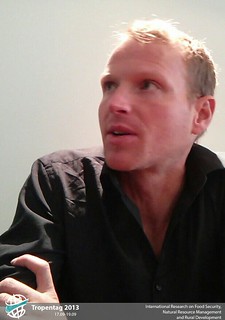

Interview with Keynote Speaker, Mr. Rene van Veenhuizen, RUAF Foundation
Thu, 09/19/2013 - 16:40 — Paulina CamposAre toilets an indicator for the peri-urban area?
Thu, 09/19/2013 - 16:32 — Kirstin Ohlendorf
One of the biggest challenges of the conference theme “rural-urban continuum” was the definition of the rural and urban landscape. In the view of Jefferson Fox from the East West Center, Honolulu (USA), this distinction between urban and rural is not useful when large areas and populations are caught between the two.
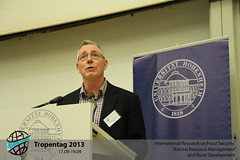

How do Non-timber forest products help Nigerian farmers?
Thu, 09/19/2013 - 15:10 — Louisa Wong
African bush butter, oil bean seeds, soursop fruits, bush mango, African bread fruit, African star apple, bitter cola… Do you know there are many edible fruits in Africa and they are socio economically important for indigenous people and farmers?
DAAD Summer School: Don’t say a word
Thu, 09/19/2013 - 14:28 — Philipp Gassner
23 Alumni from 15 countries made their way to the deepest Swabia from 8th to 16th September to learn all about “Rural development beyond agriculture” at the University of Applied Forest Sciences, Rottenburg. Having returned safely, they share their experience on Tropentag - in a photo interview without saying a word.
View the picture sequence.
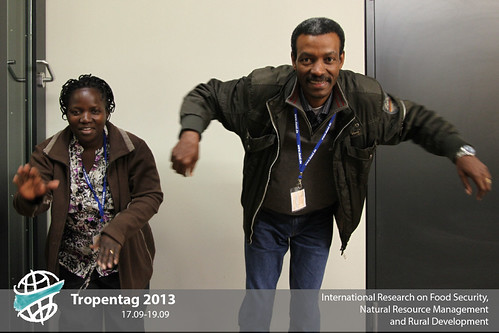

Climate Change versus Evolution: A threat to Plant Production Systems?
Thu, 09/19/2013 - 13:15 — Pamella Ogada
Session: Plant Production Systems within the rural-urban continuum
Chair: Anthony Whitbread, Georg-August-Universität Göttingen, Germany
With the ever rising effects of climate change, adaptation of crops and advanced scientific research at genetic levels, are facing major challenges due to the segregation effect on the unstable crop genotypes.
The session of Plant Production systems covered a broad area dealing mainly with agricultural production, from crop protection aspects to crop modeling to combat climate change, with the aim of creating a sustainable agricultural system.
The lead paper, by Manuel Tamo, an insect ecologist from the International Institute of Tropical Agriculture (IITA), presented a crop protection aspect specifically focusing on Biological Control.
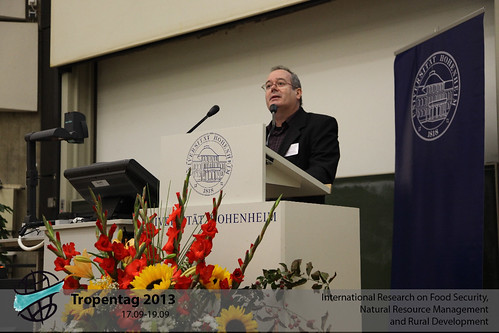 Manuele Tamo, International Institute of Tropical Agriculture (IITA), Benin.
Manuele Tamo, International Institute of Tropical Agriculture (IITA), Benin.
 Manuele Tamo, International Institute of Tropical Agriculture (IITA), Benin.
Manuele Tamo, International Institute of Tropical Agriculture (IITA), Benin.
Will We Soon be Eating Food Grown in Our Own Faeces?
Thu, 09/19/2013 - 10:51 — Vince Canger
We are all quite used to the idea of fertilizing the soil with the manure of animals and usually don't think twice about it. But imagine using human manure -- even your own -- to help grow the food that you eat. Some might scoff at the idea, but it's one that many have been researching, including Jörgen Fidjeland who discussed the use of faecal sludge as fertilizer at this year's Tropentag conference at the University of Hohenheim in Stuttgart, Germany... (read more)






